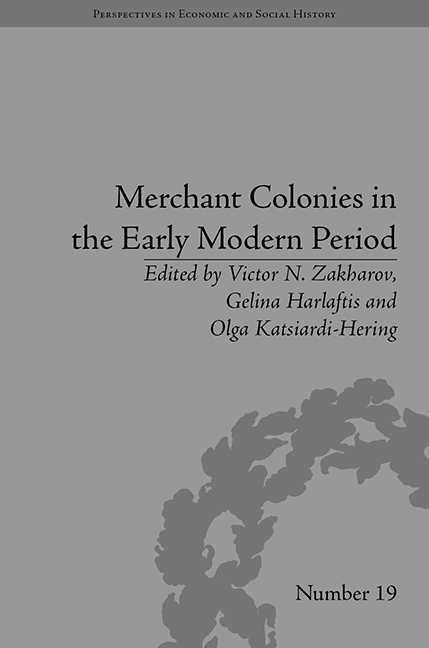Book contents
- Frontmatter
- Contents
- List of Figures and Tables
- List of Contributors
- Introduction
- 1 Early Modern English Merchant Colonies: Contexts and Functions
- 2 German and Italian Merchant Colonies in Early Modern England
- 3 Dynamism and Integration of the North European Merchant Communities in French Ports in the Eighteenth Century
- 4 Opportunity and Legislation: How the Armenians Entered Trade in Three Mediterranean Ports
- 5 Russian Merchant Colonies in Seventeenth-Century Sweden
- 6 Foreign Merchant Communities in Eighteenth-Century Russia
- 7 Greek Merchant Colonies in Central and South-Eastern Europe in the Eighteenth and Early Nineteenth Centuries
- 8 Community for Commerce: An Introduction to the Nezhin Greek Brotherhood Focusing on its Establishment as a Formal Institution in the Years Between 1692 and 1710
- 9 Entrepreneurship at the Russian Frontier of International Trade. The Greek Merchant Community/Paroikia of Taganrog in the Sea of Azov, 1780s–1830s
- Notes
- Index
1 - Early Modern English Merchant Colonies: Contexts and Functions
- Frontmatter
- Contents
- List of Figures and Tables
- List of Contributors
- Introduction
- 1 Early Modern English Merchant Colonies: Contexts and Functions
- 2 German and Italian Merchant Colonies in Early Modern England
- 3 Dynamism and Integration of the North European Merchant Communities in French Ports in the Eighteenth Century
- 4 Opportunity and Legislation: How the Armenians Entered Trade in Three Mediterranean Ports
- 5 Russian Merchant Colonies in Seventeenth-Century Sweden
- 6 Foreign Merchant Communities in Eighteenth-Century Russia
- 7 Greek Merchant Colonies in Central and South-Eastern Europe in the Eighteenth and Early Nineteenth Centuries
- 8 Community for Commerce: An Introduction to the Nezhin Greek Brotherhood Focusing on its Establishment as a Formal Institution in the Years Between 1692 and 1710
- 9 Entrepreneurship at the Russian Frontier of International Trade. The Greek Merchant Community/Paroikia of Taganrog in the Sea of Azov, 1780s–1830s
- Notes
- Index
Summary
Introduction
In the early modern period, many European commercial towns, including the main Turkish, Italian, Spanish, French, English and Russian ports, harboured communities of foreign merchants. The present article aims to contribute to the explanation of this phenomenon – the settlement of merchants abroad. Up till now, the literature has not addressed this question in a structural way. The historiography on merchant colonies is mainly limited to the study of commercial settlements in particular cities, for example the foreign merchants in Hamburg or in Bergen. The topic is less frequently studied from the opposite direction, i.e. by focusing on a country's merchant communities in foreign cities. The latter approach places merchant settlements within the broader context of a country's commercial network. Quite extensive work has already been done on the dispersion of Greek and Jewish communities in south-east Europe. Research focusing specifically on the pattern and function of north-west European trade settlements is rare, however. Fifteen years ago, a first attempt in this direction was made by the second author of the present paper, who studied the case of Dutch merchant colonies. In this paper we pursue a similar strategy by studying British merchant colonies during England's commercial expansion from the late sixteenth century onwards.
Veluwenkamp's earlier article discusses the function of merchant colonies in the Dutch commercial system from 1550 to 1750. He argued that through these colonies the Dutch developed new markets in the late sixteenth and seventeenth centuries.
- Type
- Chapter
- Information
- Merchant Colonies in the Early Modern Period , pp. 11 - 30Publisher: Pickering & ChattoFirst published in: 2014



